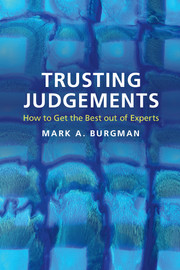Preface
Published online by Cambridge University Press: 05 November 2015
Summary
This book is intended for people in government, regulatory agencies and business who routinely make decisions and who rely on scientific and technical expertise. So-called evidence-based decision-making has become more popular over the last decade, but often the evidence we need for these decisions is unavailable. Time, money and the pressing nature of many decisions prevent us from collecting much of the information we need. In its place, decision-makers turn to experts to estimate facts or make predictions. The status of scientific and technical experts has evolved over the last 100 years or more to provide unprecedented opportunities for experts to influence decisions. The hidden risk is that scientists and other experts overreach, often with good intentions, placing more weight on the evidence they provide than is warranted. The tendency to overreach is pervasive and more significant than many scientists and decision-makers like to admit. Much of the evidence for these phenomena is drawn from well-established research on decision theory and cognitive psychology. This book documents the extent and importance of this issue, and then outlines a suite of simple, practical tools that will assist decision-makers to make better use of expert estimates and predictions. It provides the means to discriminate good advice from poor, and to help decision-makers to be reasonably and appropriately sceptical. The book promotes a change in attitude towards expert predictions and estimates such that they are treated with the same reverence as data, subjected to the same kinds of cross-examination and verification. By requiring a little discipline from their experts, decision-makers can avoid the most pervasive pitfalls of expert judgements and assure themselves of relatively reliable and accurate expert information.
- Type
- Chapter
- Information
- Trusting JudgementsHow to Get the Best out of Experts, pp. vii - viiiPublisher: Cambridge University PressPrint publication year: 2015



